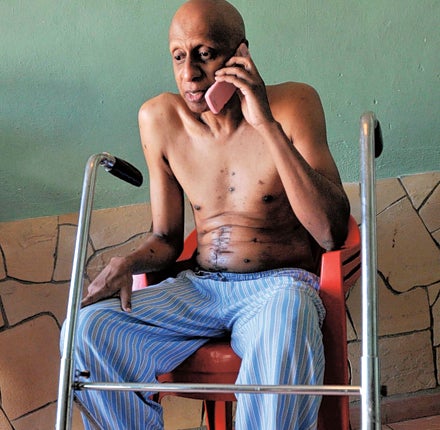Hunger-striking Cuban dissident wins EU prize

The European Parliament awarded its top human rights prize yesterday to Cuban dissident Guillermo Farinas, whose hunger strike helped pressure Havana into freeing political prisoners.
The 48-year-old psychologist, journalist and former soldier has been on more than 20 hunger strikes in the last 20 years for various causes.
The European Union, along with the United States, has long pressed Havana to improve human rights and move towards democracy.
"Farinas was ready to sacrifice and risk his own health and life as a means of pressure to achieve change in Cuba," European Parliament President Jerzy Buzek told the assembly in announcing the award.
The 27-state EU lifted diplomatic sanctions against communist-run Cuba in 2008, but continues to tie economic cooperation with the island to the plight of political prisoners. Farinas received word of the prize at his modest home in Santa Clara, 170 miles east of Havana, where he said it was a prize not for him, but "for the Cuban people, for the prisoners... for our brothers who are in the streets, and the exiles".
"This prize shows that democratic and civilised governments in any part of the world, in this case the Europeans, keep their eyes on the situation of human rights in Cuba," he said.
"They are sending a message of dissatisfaction with the steps the Cuban government has taken to improve the human rights situation on the island."
Havana – which considers its political prisoners to be mercenaries working for its long-time ideological foe, the United States – agreed in July to free 52 and send them to Spain, in a deal brokered by the Catholic Church.
An announcement of that agreement prompted Farinas, who was said to be near death at the time, to end a 135-day hunger strike.
Cuban human rights groups say that, besides the 52, there remains around 100 people jailed in Cuba for political reasons. Under the island's penal code, dissidents can be arrested, tried and jailed for speaking and writing against the communist government under charges like "enemy propaganda," "clandestine printing" and "unlawful association."
Spain has pressed for closer EU ties with the Havana government but other member states have so far opposed a change of policy, and one rights group called on the EU yesterday to keep up pressure on Cuba.
"This (prize) sends a message to European governments that relations with Cuba cannot be fully normalised until there is significant progress on human rights," said Reed Brody, a spokesman for the New York-based Human Rights Watch group.
The EU prize, named after the late Soviet dissident Andrei Sakharov, was first awarded in 1988. Last year, it went to Memorial, a Russian group campaigning against abuses of power.
The prize has gone to Cubans twice before – in 2002 to dissident Oswaldo Paya and in 2005 to the opposition group Ladies in White, formed by wives and mothers of Cuban political prisoners. Paya was permitted by the Cuban government to go and accept the prize, but the Ladies in White were not. It was not yet known if Farinas would be allowed to go to Strasbourg in December for the official award ceremony.
So far, 39 of the promised 52 prisoners have been freed and Farinas has said he will launch another hunger strike on 7 November if all of them have not been released by then.
Subscribe to Independent Premium to bookmark this article
Want to bookmark your favourite articles and stories to read or reference later? Start your Independent Premium subscription today.

Join our commenting forum
Join thought-provoking conversations, follow other Independent readers and see their replies